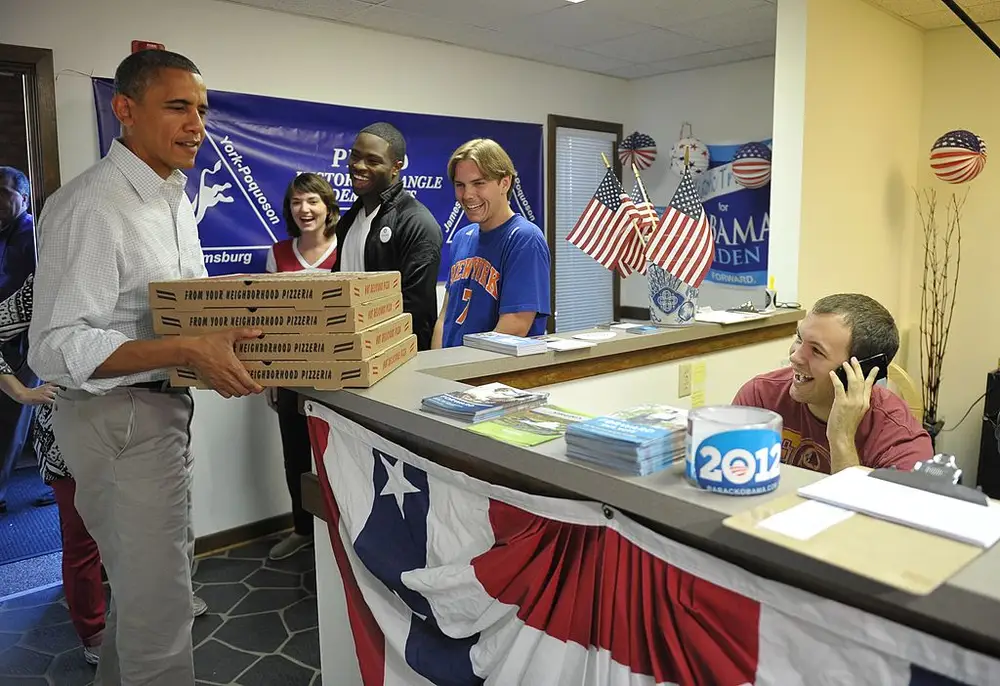Campaign staffers are stressed — and it shows in their diets

Campaign staff is typically stocked with comfort food — but one can only eat pizza so many days in a row.
When Mike Sistak worked on Sen. John McCain and Sen. Mitt Romney’s presidential bids, he became an unwitting fast food loyalist.
“I probably ate my weight in Jimmy John’s and Subway on those campaigns,” he told B-17 over the phone. Between rallies and phone calls, he chomped away at the sandwiches, one of many frantic campaign staffers without enough time for a sit-down meal.
To work on a presidential campaign is to give up your life for about a year and a half — it is also to give up your kitchen and, for some, your health.
When B-17 asked current and former staffers about their foods of choice during campaign season on X, many responded saying Diet Coke, cigarettes, or a combination of the two. Sistak said he was a soft drink fanatic, but his doctor demanded he give up either soda or coffee because he was consuming too much caffeine.
Marisol Samayoa, the 31-year-old communications director for Rep. Adam Schiff’s campaign, said in an email that green juice and Zyn, a brand of nicotine pouch, keep her going. In mid-September, the verified Twitter of Rep. Elissa Slotkin’s Senate campaign responded to B-17 saying that it had gone through 12 family-sized bags of Nerd gummy clusters.
And then there are the protein junkies.
In a post on X, former Buttigieg staffer Pablo Roa said that he relied on the humble hard-boiled egg, and confirmed as much over email with B-17. Sistak, who was 26 when he worked on Romney’s presidential bid, consumed a steady stream of protein bars.
Entertaining habits aside, though, the eat-as-you-go, efficiency-above-all-else culture can take its toll. Staffers tend to be younger and their bodies more forgiving, but few are immune to the physical pressures of a campaign.
Sistak told B-17 that he lost around 20 pounds while working for McCain, only to gain weight during his time with the Romney team.
“I barely had time to take care of myself,” he told B-17. Whenever he passed a Whole Foods, he would make sure to stop in and get a salad.
“I’d get some leafy greens, if not just for my own health, but so my mother knew I was getting some decent nutrition,” Sistak said. “I haven’t met a single campaign staff person who hasn’t had a similar experience.”
Mike Nellis, a veteran campaign staffer who was a senior advisor to Vice President Kamala Harris through her first presidential run, partly attributes that common experience to his own health struggles.
“I assume I was 600 pounds at my largest; the highest I ever actually weighed in was 550 pounds because I was too scared to step on the scale,” he wrote in a thread on X responding to an online attack about his weight.
Nellis, now 36, told B-17 that campaign culture is better now than when he started two decades age. Still, he said an epidemic of burnout persists, which contributes to the frenzied culture around food. While hunger suppressants, like cigarettes, are common sights among staffers, campaign offices are also stocked with junk food. DoorDash is a lifeline for those shuttling themselves from one event to another.
“Part of it was the stress of working on the campaign and the access and ease of running to McDonald’s drive-thru at 11:45 after attending a campaign rally,” Nellis said. He said he didn’t drink a lot, but said that alcohol itself functioned as a common social activity.
People also don’t cook much. When Nellis stood over his stove, it was to make a frozen pizza or easy mac. When Sistak worked on Romney’s campaign, he had an apartment in Lansing, Michigan, but he said he rarely slept — or cooked — there.
Whether it is the warning Sistak got from his doctor about his caffeine intake or Nellis feeling his days were too short for intentional meals, campaigns seem to impact staffers’ physical health.
“I think one of the great shames of this industry is we borrow young people’s passion for making the world a better place at the expense of their mental and physical health,” Nellis said. “We burn people out by asking them to do too much. We ask them to treat their body poorly because they don’t have the time to take care of themselves.”






